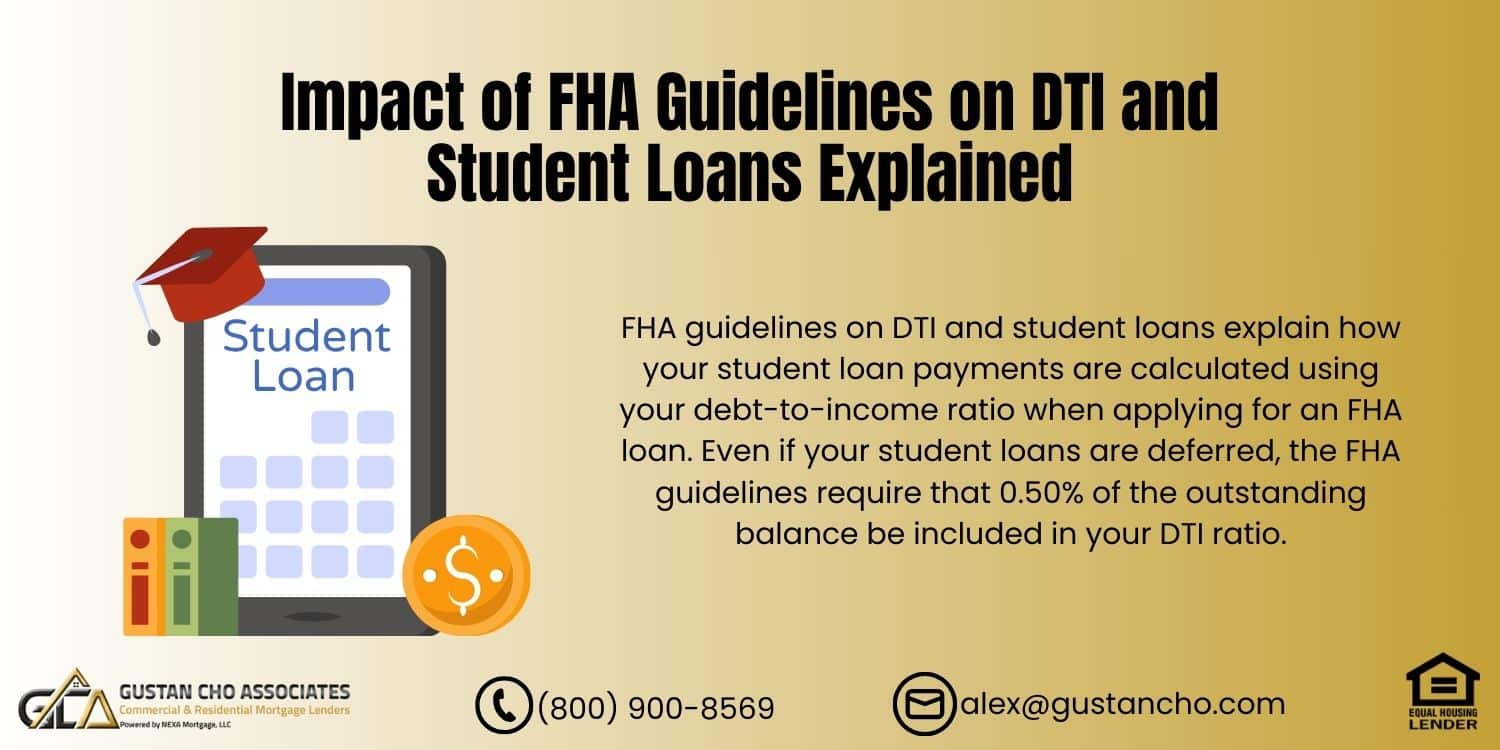Struggling with student loan debt can often feel like attempting to run a marathon with a heavy backpack, particularly when you want to purchase your own home. Adding car payments on top of student loans makes your budget tight, and it all plays a big part in calculating your mortgage debt-to-income (DTI) ratio. This ratio is a big deal when you’re hoping to qualify for a home loan.
In the past, the HUD department, the big umbrella organization for FHA loans, was pretty chill about student loans. They used to let borrowers not worry about including deferred student loan payments in their DTI calculations as long as those payments were paused for at least 12 months. But hold your horses because things have shifted a bit.
We’re entering new territory with updated FHA guidelines on DTI and student loans for 2024. This change is something to watch closely if you’re juggling student loan payments and dreaming of hanging your own “Home Sweet Home” sign. This guide is designed to simplify these new FHA guidelines on DTI and student loans, breaking them down into everyday language that won’t make your head spin. So, whether it’s over a coffee break or while you’re figuring out your monthly expenses, let’s get you up to speed on what these updates mean for your home-buying journey.
What is the Debt-to-Income (DTI) Ratio?
Let’s break down the concept of the Debt-to-Income (DTI) Ratio in simpler words. When borrowing money, lenders look at your DTI ratio to understand how much of your paycheck is already earmarked for other debts you’re paying off every month. What they’re calculating is pretty straightforward: they take the total amount you pay out for debts each month and divide it by what you earn before taxes are taken out. It helps them see if your budget has enough breathing room to take on new debt comfortably.
There are two flavors of this DTI ratio to be aware of:
- Front-end DTI focuses just on your home costs. Think of your monthly mortgage, property tax, and insurance payments.
- Back-end DTI, however, looks at the whole picture. It includes everything — from your car loan and credit card bills to student loans.
Speaking of loans, let’s talk about FHA loans. The federal government backs these, and they are a popular choice among first-time homebuyers. FHA guidelines on DTI and student loans are clear. When buying a home with an FHA loan, they allow a front-end DTI of up to 46.9%. That means nearly half your income can go towards housing expenses. The back-end DTI, which includes all your debt like those student loans, permits up to 56.9%.
This flexibility is one reason FHA loans appeal to many, especially if you’re juggling student loans alongside your dream of homeownership.
Struggling with Student Loans? Let’s See How FHA Guidelines Can Help You Qualify!
Contact us today to understand how student loans affect your DTI and learn how you can qualify for an FHA loan.
How Student Loans Affect DTI
Student loans significantly impact your DTI ratio, affecting your ability to qualify for a mortgage. Even if your student loans are deferred, they will be included in your DTI calculations. Here’s how FHA guidelines handle student loans:
FHA Guidelines on Deferred Student Loans
Under the HUD 4000.1 FHA Handbook, launched on September 14, 2015, deferred student loans must be included in DTI calculations. Even if your student loans have been deferred for more than 12 months, they will still count in your DTI ratio.
New FHA Guidelines for 2024
As of 2024, the FHA has updated its guidelines to help borrowers with large student loan balances. Mortgage underwriters must now use 0.50% of all deferred student loan balances as a hypothetical monthly debt for DTI calculations. This change is crucial for professionals with high student loan balances, such as doctors, dentists, pharmacists, attorneys, and engineers.
For instance, if you have a student loan balance of $200,000, 0.50% ($1,000) will be used as your monthly payment in DTI calculations, regardless of the actual deferred payment amount.
Borrowers with High Student Loan Debt
Imagine you’re saddled with student loans totaling $200,000. Traditionally, a standard repayment plan might set your monthly dues at around $1,000. This amount, $1,000, is often used to figure out your debt-to-income (DTI) ratio, an important number lenders look at.
But let’s say you’re on an income-based repayment (IBR) plan because things are tight, and your monthly payment drops to $300. FHA guidelines on DTI and student loans show this is a game-changer. The FHA uses this lower payment when calculating your DTI ratio.
So, for your DTI, they’ll consider the $300 payment instead of calculating it based on 0.50% of your loan amount, which would have been the $1,000. This greatly affects how affordable your loan appears and can influence your buying power.
How to Get a Fully Amortized Monthly Payment
Consider setting up a fully amortized monthly payment plan to manage your student loans better and potentially reduce your monthly payments. This is especially useful when aligning with FHA guidelines on DTI and student loans. Here’s a straightforward approach:
- Contact your student loan provider: They are there to help and can guide you through the process.
- Request a fully amortized monthly payment over the maximum term: You’ll want to stretch this over the longest term possible, often 25 years. This extended term can significantly lower your monthly dues.
- Provide this figure to your mortgage lender:Once you’ve calculated this new monthly payment, share this information with your mortgage lender. This is a critical step, especially if you’re applying for an FHA loan.
Opting for a fully amortized plan can bring your payments down more than the typical 0.50% estimation. Lower payments mean a better debt-to-income (DTI) ratio, positioning you more favorably under the FHA guidelines on DTI and student loans. Ultimately, this can enhance your chances of qualifying for an FHA loan, making homeownership more accessible.
FHA Guidelines on Income-Based Repayment (IBR)
Qualifying for a mortgage can be challenging for borrowers with high student loan balances. However, FHA guidelines allow using income-based repayment (IBR) plans under certain conditions. Here’s what you need to know:
- IBR Plans: These plans use your income and family size to calculate how much you need to pay each month toward your student loan. The payment amount can be significantly lower than the standard repayment plan.
- Qualifying with IBR: If your IBR payment fully amortizes your loan over its term, the FHA will use this amount for DTI calculations. If not, they will use the greater of 0.50% of the outstanding balance or the reported monthly payment.
Comparison Between FHA and Conventional Loans
When deciding between a loan from the Federal Housing Administration (FHA) and a conventional loan, you must look at how each one treats your debt-to-income (DTI) ratio and what they do about your student loans. Let’s break it down in simpler terms:
FHA Loans
The FHA guidelines on DTI and student loans are borrower-friendly. For your DTI, FHA loans allow your front-end ratio (the part of your income before taxes that goes towards housing expenses) to be as high as 46.9%. For your back-end ratio (all your monthly debt payments, including housing, compared to your pre-tax income), you can go up to 56.9%.
This is generous and can help many people qualify for a home loan. Plus, if you’re on an income-based repayment (IBR) plan for your student loans, the FHA will include this in their calculations in a way that works well for you.
Conventional Loans
These loans are different when it comes to the DTI ratio and how they view your student loans. There isn’t a set limit for your front-end DTI ratio, but generally, they want your back-end ratio to be 50% or less. It’s tighter than what FHA allows. And when it comes to student loans, especially if you’re on an IBR plan, conventional loans might not be as accommodating as FHA loans. They may not weigh your IBR payments in the same positive light, which can make a difference in your loan approval process.
So, looking into FHA loans is a good step if your income and debt situation is a bit tighter, especially with student loans. Their guidelines on DTI and how they handle student loan payments can offer some advantages.
Concerned About Student Loans and DTI? Let’s Review FHA Loan Guidelines Together!
Contact us today to discuss how student loans impact your loan eligibility and how we can help you qualify.
Steps to Qualify for an FHA Loan with Student Loans
Securing an FHA loan can be a smart move if you’re carrying student loans and dreaming of owning a home. Here’s a simplified guide to help you navigate the process successfully, keeping in mind the FHA guidelines on DTI and student loans.
- Calculate Your DTI: Start by calculating all your monthly debts. Remember to include what you pay on your student loans. A good rule of thumb is to use either 0.5% of your total loan balance or what you pay under an Income-Based Repayment (IBR) plan, whichever applies. This is an important step because it directly affects how much you can borrow according to FHA guidelines.
- Check Your Credit Score To fall within the sweet spot for FHA loans, you need a credit score of at least 580. But remember, a higher score increases your chances and possibly secures you a better interest rate. So, take a moment to review your credit report. Ensure everything’s accurate and no mistakes drag your score down.
- Collect All Necessary Documents: You’ll need a few things to prove your financial stability. Gather your recent pay stubs, tax returns from the last two years, bank statements, and, of course, details of your student loans. These documents will help your lender assess your financial health.
- Contact a Mortgage Lender: Finding a lender well-versed in FHA loans can be a game-changer. They’ll be your guide, explaining all the steps and helping you understand how your student loans fit into the picture according to FHA guidelines. They’re there to make sure you’re on the right track to get your loan approved.
By following these steps and considering the FHA’s perspective on DTI and student loans, you’ll be better prepared to qualify for an FHA loan, moving one step closer to your dream home.
Tips for Reducing Your DTI Ratio
If you struggle with a high DTI (debt-to-income) ratio, which might be stopping you from qualifying for an FHA loan, don’t worry! There are practical ways to work on lowering that number. Here are a few down-to-earth suggestions:
- Pay Down Debt: Start by tackling your smaller debts. Paying these off feels great and reduces your monthly expenses. This is a crucial step because every little bit helps decrease your overall DTI ratio.
- Consider different approaches to supplement your income: Whether it’s picking up a part-time job, doing freelance work, or any other side hustle, increasing your income can significantly impact your DTI ratio. More money coming in means you have a better shot at meeting the FHA guidelines on DTI and student loans.
- Refinance Student Loans: Student loans can be a big part of your DTI ratio. It’s worth looking into refinancing options. Refinancing could potentially lower your monthly payments, making it easier to manage alongside your other debts. This step is especially pertinent when dealing with FHA guidelines on DTI and student loans, as making your student loan payments more manageable can directly help you meet those requirements.
- Avoid New Debt: Lastly, a crucial piece of advice, steer clear of taking on new debts, especially as you’re getting ready to apply for a mortgage. It might be tempting to charge that new living room set to your credit card but resist the urge. Taking on new debt can bump your DTI ratio, moving you further away from FHA loan eligibility.
Remember, the goal is to position yourself in the best possible light for lenders, fitting comfortably within the FHA guidelines on DTI and student loans. These steps aren’t just about crossing regulatory thresholds but about adopting healthier financial habits that benefit you in the long run.
Conclusion
Navigating the FHA guidelines on DTI and student loans can be challenging, especially with the changes that have come into effect in 2024. Understanding how your student loans impact your DTI ratio is crucial for qualifying for an FHA loan. Remember to calculate your DTI accurately, gather all necessary documentation, and work with a knowledgeable mortgage lender.
At Gustan Cho Associates, we specialize in helping borrowers with high student loan balances qualify for FHA loans. We don’t have mortgage overlays and can give you personal advice and other loan options to help you become a homeowner. Contact us at 800-900-8569, text us for a faster response, or email us at gcho@gustancho.com. We’re available evenings, weekends, and holidays to assist you.
By staying informed and proactive, you can navigate the complexities of FHA guidelines and secure the home loan you need.
FAQs: Impact of FHA Guidelines on DTI and Student Loans Explained
- 1. What are FHA guidelines on DTI and student loans? FHA guidelines on DTI and student loans explain how your student loan payments are calculated using your debt-to-income ratio when applying for an FHA loan.
- 2. How do student loans impact my DTI ratio for an FHA loan? Even if your student loans are deferred, the FHA guidelines require that 0.50% of the outstanding balance be included in your DTI ratio.
- 3. Can I exclude deferred student loans from my DTI calculation? According to FHA guidelines, deferred student loans must be included in your DTI calculation.
- 4. What is the maximum DTI ratio allowed for an FHA loan? FHA loans allow a front-end DTI ratio of up to 46.9% and a back-end DTI ratio of up to 56.9%.
- 5. How do I calculate my DTI ratio for an FHA loan? Calculate your monthly debt payments, including 0.50% of your student loan balance or your IBR payment. Then, divide the total by your gross monthly income.
- 6. Can I use my Income-Based Repayment (IBR) plan for DTI calculations? If your IBR payment fully amortizes the loan over its term, the FHA will use this amount for DTI calculations.
- 7. How can I lower my DTI ratio to qualify for an FHA loan? Pay down smaller debts, increase your income, refinance your student loans, and avoid taking on new debt.
- 8. What credit score do I need to qualify for an FHA loan? Generally, it would help if you had a minimum credit score of 580 to qualify for an FHA loan.
- 9. What documentation do I need to apply for an FHA loan? You will need pay stubs, tax returns, bank statements, and student loan statements to apply for an FHA loan.
- 10. Who can help me navigate FHA guidelines on DTI and student loans? Contact a mortgage lender specializing in FHA loans, like Gustan Cho Associates, for personalized guidance and assistance.
If you have any questions about FHA Guidelines on DTI and Student Loans, please contact us at 800-900-8569. Text us for a faster response. Or email us at alex@gustancho.com. The team at Gustan Cho Associates is available 7 days a week, on evenings, weekends, and holidays.
This blog about the Impact of FHA Guidelines on DTI and Student Loans Explained was updated on August 6th, 2024.
FHA Guidelines on DTI and Student Loans Got You Confused? Let’s Make It Clear!
Reach out today to learn how these guidelines can help you qualify for a mortgage.









